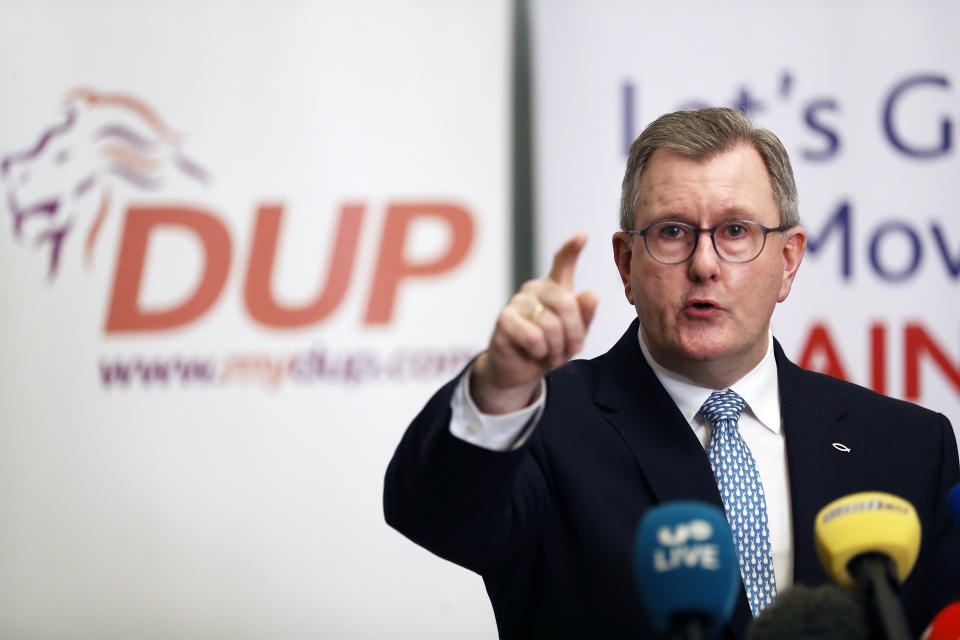Leader of Northern Ireland's main unionist party steps down as he is charged with sexual offenses
LONDON (AP) — Northern Ireland's finely balanced power-sharing arrangements were thrown into disarray Friday as the leader of the region's largest unionist party stepped down after being charged with historical sexual offenses.
Jeffrey Donaldson informed the Democratic Unionist Party that he was leaving his post due to the investigation and has been suspended from the party pending the outcome of the judicial process, the DUP said in a statement.
The announcement came after police in Northern Ireland said a 61-year-old man had been arrested and charged with non-recent sexual offenses. A 57-year-old woman was charged with aiding and abetting additional offenses, the Police Service of Northern Ireland said. Both suspects are due in court on April 24.
British police generally don't identify suspects by name.
Donaldson, who has led the DUP since 2021, is the most powerful figure in Northern Ireland’s unionist movement, which seeks to maintain the region’s historic ties to the United Kingdom. His departure is likely to weaken the party as it prepares for U.K. parliamentary elections later this year and maneuvers to fend off demands from the nationalist party Sinn Fein for reunification with the Republic of Ireland to the south.
Donaldson, who has been a member of Parliament since 1997, spent the past two years playing a high-stakes game of political poker as he sought to wring concessions from the British government over post-Brexit trading arrangements with the European Union, which unionists believed would threaten their links to the rest of the United Kingdom.
He took the DUP out of Northern Ireland's power-sharing government in January 2022, hamstringing institutions designed to balance the demands of unionists and nationalists. The party finally agreed to return to power-sharing earlier this year after authorities in London provided a series of assurances about the region's constitutional position within the United Kingdom. The U.K. government also agreed to give Northern Ireland more than 3 billion pounds ($3.8 billion) for its battered public services once the Belfast government got back on track.
The agreement marked “a positive and decisive step forward for Northern Ireland,” Donaldson said at the time.
Donaldson was seen as the deal's biggest backer, and the lack of someone with his stature to hold together the sometimes fractious DUP could cause trouble down the road, said Prof. Jonathan Tonge, an expert on Northern Ireland at the University of Liverpool.
“I think the political institutions will hold, but it’s still a problem longer term in the fact that their biggest salesman, the person who sold this deal to a party that was quite reluctant in many ways to go back into power sharing with Republicans and nationalists, you know, he is now out of the equation,'' Tonge said.
"It could be the end of his political career, and there’s no one of that caliber, potentially within the DUP having a hold over the party to carry on selling what was a difficult deal in the first place.''
Gavin Robinson, deputy leader of the DUP since June of last year and the member of Parliament for Belfast East, was named interim party leader.
Donaldson has been active in unionist politics since he was 18 and was first elected to the Northern Ireland Assembly in 1985 as a member of the Ulster Unionist Party, then the biggest unionist party.
He has been a member of the U.K. Parliament since 1997 and was a member of the UUP's negotiating team in the talks that led to the 1998 Good Friday Agreement, which largely ended decades of violence in Northern Ireland. But he walked out of the talks before the deal was completed, arguing that the party shouldn't join a power-sharing government with Sinn Fein until the Irish Republican Army had decommissioned all of its weapons.
After years of arguments with the leadership of the UUP, Donaldson joined the Democratic Unionist Party in 2004.
“Jeffrey Donaldson went from strength-to-strength politically on the basis of opposition to the Good Friday Agreement,'' Tonge said. "Here we are 26 years later, Jeffrey Donaldson appearing in an impregnable position as leader of unionism himself. And yet he falls from that position. Always expect the unexpected.”



